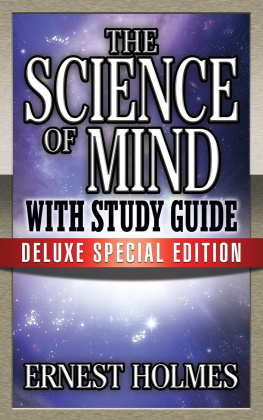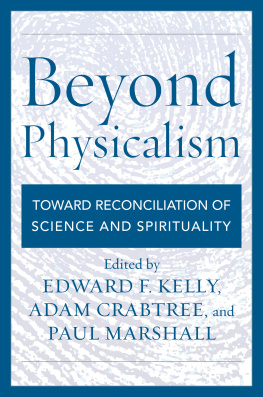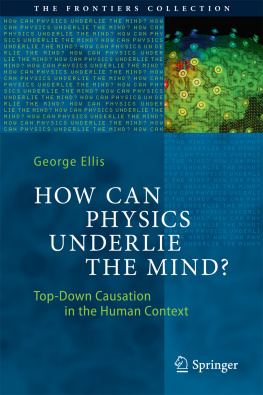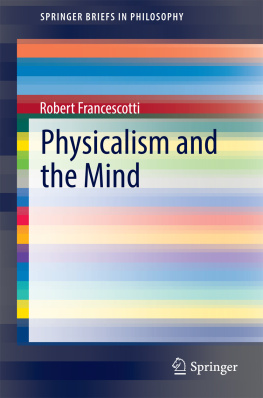
CATALOGACIN EN LA PUBLICACIN UNIVERSIDAD NACIONAL DE COLOMBIA
Morales Otero, Juan Diego 1980-
The emergence of mind in a physical world / Juan Diego Morales Otero. Primera edicin. Bogot : Universidad Nacional de Colombia. Facultad de Ciencias Humanas, Departamento de Filosofa, 2018. 232 pginas: ilustraciones en blanco y negro, diagramas. (Biblioteca abierta. Serie Filosofa ; 459)
Incluye referencias bibliogrficas e ndice de materias.
ISBN 978-958-783-326-3 (rstica). ISBN 78-958-783-327-0 (e-book).
1. Filosofa de la mente 2. Superveniencia 3. Emergencia o surgimiento (Filosofa) 4. Positivismo lgico 5. Filosofa de la ciencia 6. Teleologa 7. Causalidad II. Ttulo III. Serie
CDD-23 128.2 / 2018
The Emergence of Mind in a Physical World
Biblioteca Abierta
Coleccin General, serie Filosofa
2018, Universidad Nacional de Colombia,
sede Bogot, Facultad de Ciencias Humanas,
Departamento de Filosofa
2018, Autor, Juan Diego Morales Otero
Primera edicin, 2018
ISBN impreso: 978-958-783-326-3
ISBN digital: 978-958-783-327-0
Comit editorial Facultad de Ciencias Humanas
Luz Amparo Fajardo Uribe, Decana
Nohra Len Rodrguez, Vicedecana Acadmica
Constanza Moya Pardo, Vicedecana de Investigacin y Extensin
Carlos Tognato, Director del Centro de Estudios Sociales -CES-
Jorge Aurelio Daz, Director Revista Ideas y Valores
Rodolfo Surez Ortega, Representante de la Unidades Acadmicas Bsicas
Preparacin editorial
Centro Editorial de la Facultad de Ciencias Humanas
www.humanas.unal.edu.co
Camilo Umaa, Diseo original de la coleccin
Camilo Baquero Castellanos, direccin
Anglica M. Olaya M., coordinacin editorial
Juan C. Villamil N., coordinacin grfica - maquetacin
Rosario Casas, correccin de estilo
Prohibida la reproduccin total o parcial por cualquier medio, sin la autorizacin escrita del titular de los derechos patrimoniales.
For Sri Ka, the Taitas of Putumayo, and my family, without whom this would not have been possible
So my aim is only to establish conditional claims of the form: even if certain facts are emergent vis--vis the microphysical realm, Physicalism can still be true.
PAPINEAU 2008 132
Thus, for emergent evolution, conscious events at level C (mind) involve specific physiological events at level B (life), and these involve specific physico-chemical events at level A (matter). No C without B , and no B without A . No mind without life; and no life without a physical basis.
MORGAN 1923 15
I am not, for example, denying that there occur mental processes. Doing long division is a mental process and so is making a joke. But I am saying that the phrase there occur mental processes does not mean the same sort of thing as there occur physical processes, and, therefore, that it makes no sense to conjoin or disjoin the two.
RYLE 2009 11-2
No one has contributed as much to our understanding of the problems of mental causation in recent years as Jaegwon Kim. We non-reductive materialists must face up to the serious difficulties he has raised for our position.
BLOCK 2003 133
Whereas, if it isnt literally true that my wanting is causally responsible for my reaching, and my itching is causally responsible for my scratching, and my believing is causally responsible for my saying, if none of that is literally true, then practically everything I believe about anything is false and its the end of the world.
FODOR 1990 156
Acknowledgments
I WOULD LIKE TO thank Professor Alejandro Rosas, without whose invaluable help and support I would not be presenting this dissertation. I would also like to thank many people who, in one way or another, have positively influenced the development of the ideas set forth here: Professors Brian McLaughlin, Larry Shapiro, Reinaldo Bernal, Louis Sass, Jaegwon Kim, Jaime Ramos, William Duica, Juan Botero, Adrian Cussins, Ignacio vila, Gonzalo Serrano, Barbara Montero, and Alicia Juarrero; my philosophical and non-philosophical friends Omar Contreras, Noelly Guerrero, Anglica Santacruz, Ximena Velosa, Alejandro Gonzales, Jos Tovar, Luis Yag, David Corts, Juan Camilo Espejo, Paula Gutirrez, Danilo Rodrguez, Mbel Reyes, Aimer Daz, Carlos Garzn, Alejandro Murillo, Louis Cohen, Leonardo Gmez, and Teyrun Torres; the different students that have endured me; and, finally, my family: my parents Martha Elcy and Pedro Ignacio; my sisters Natalia, Puspanjali, and Sandra; my brothers Achara and Moiss; and, especially, my girlfriend Margoth.
During the course of my research, I was awarded the Outstanding Graduate Student Scholarship by the Universidad Nacional de Colombia.
Introduction
ONE OF THE OLDEST and most important philosophical problems is the question about human uniqueness. We know that Descartes introduced his dualist proposal with the aim of explaining it, and we also know that his position entails seemingly intractable problems. Since the beginning of Modernity, philosophers like Spinoza and Leibniz have noted that Descartes proposal cannot be correct because mind and matter would constitute completely different substances, with such different attributes that they could not even be causally related to each other. It is precisely because of the existence of a prima facie metaphysical difference between minds and bodies that the question about their connection has occupied a central place throughout the history of Western thought, a crucial issue that has been called the mind-body problem.
Following the anti-Cartesian spirit, the physicalist proposal argues that our world, and therefore the human mind as one of its most important components, should be understood as fundamentally physical. It is now clear, as Gillett and Loewer (2001 ix) remind us, that the Weltanschauung of much contemporary philosophy is the doctrine of physicalism and, in consequence, as Kim comments, [a] strong physicalist outlook has shaped contemporary discussions of the mind-body problem (2005 1).


